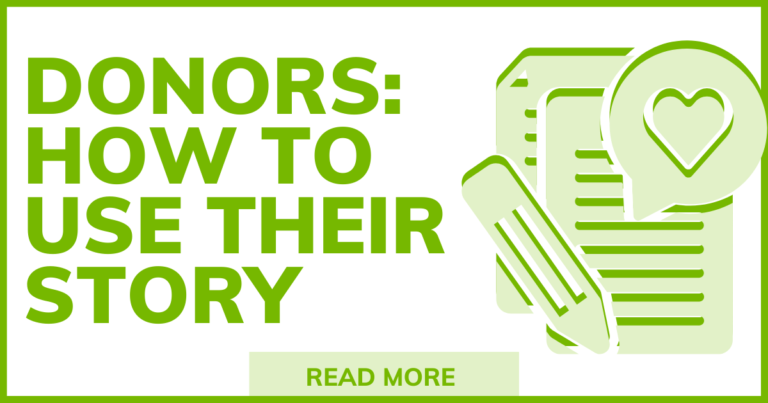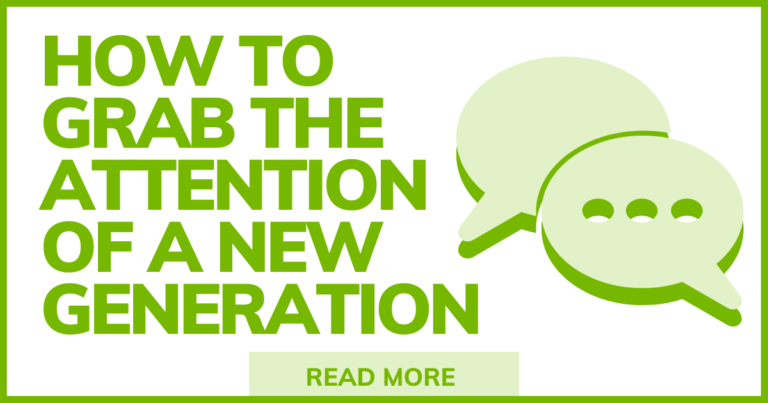In 2015 the Annual Review of Psychology published an article called Emotion and Decision Making exploring the assumption that emotions are the dominant driver of most meaningful decisions in life.
In terms of how this works for fundraising; appealing to emotions creates a connection between you and your donor/funder, which makes them more open to your calls to action. Whatever type of fundraising you are looking to do the essence of why people give remains the same: people give to people.
People don’t donate to faceless organizations or buildings. They give to change lives and save lives, and because someone asked them to. People are the basis of every fundraising campaign.
Emotional persuasion starts with understanding who you are talking to. Great fundraisers know their donor base (who they are, how much they can give, why they give). They know that the language you use for a website or social post is very different to that for a trust application.
The term for this is “emotional copywriting” and comprises two main factors:
- Trigger words
- Storytelling
Before we look at the power of individual words in your fundraising let’s look at these in a little more detail to help you understand why both are so important to your fundraising.
Trigger words
Trigger words are commonly associated with specific emotions. When read, they subconsciously trigger those emotions. Repeatedly using words that typically trigger a certain emotion will, inevitably, trigger that emotion.
First, ensure you understand the words your audience is familiar with. Trigger words are not universal, and the best way to discover them is to do some research into the words your audience may use. Remember this can be different for an individual donor or a grant making trust. For individual donors look at websites of other charities with similar aims. For grant making trusts research their website and look at the words they use to describe what they fund and previous grant recipients.
When choosing the trigger words to use, choose each word with purpose, especially in headlines and calls to action. Examine each word and consider how it makes you feel. Is there a more emotional word you could use? Every word should be part of a cohesive emotional story.
Storytelling
A marketing study at Stanford University in the USA, asked students to give a one-minute pitch. 10% of those students used the basis of a story as their pitch. When asked to recall the pitches later, only 5% of students could cite a statistic, but 63% could remember the story.
Our brains respond to stories; we invest in stories whether that is in a book, film etc. We need to know how the story ends. Evoking emotions through storytelling is a powerful tool – just watch any Disney film!!
The statistics and facts you use on your website or in a funding application are extremely valuable but the emotions you trigger with your story and language (trigger words) you use are more persuasive. Once you feel something through trigger words or storytelling, you can connect with any audience and once someone had connected with your idea, you can more easily persuade them to take the action you want them to.
To conclude, for success you need to make both an emotional appeal and present an emotional benefit. For example, ‘This is why you should feel this way about this issue. Now, take this action’.
Trigger words should be used throughout your copy to inspire and maintain the emotion. Tap into your audience’s existing vocabulary (through your research) for the best results. Craft a story with a protagonist, a beginning, middle, and end. Facts and figures won’t evoke emotion, the relatable story you tell evokes the emotion which can be supported by your facts and figures.
This brings us onto the types of words you can use to increase your donations. There is lots of advice on the internet about successful words to use in fundraising but there are 8 that appear again and again:
Download our Latest Whitepaper
TOP 10 FUNDRAISING TIPS TO HELP YOU BOOST YOUR FUNDRAISING AND GENERATE MORE GRANT APPROVALS
1. You/Your
Charities often spend time talking about themselves and their cause. For example, “We” succeeded in this. These words can make donors feel excluded and unappreciated. Are you focusing on your donors or on you?
Where possible you should aim to replace words like “we” and “us” with “you” because your donors want to know that they make a difference when they give.
For example:
- You allowed us to run 100 sessions last year helping 1000 people.
- Thank you for your support.
- With your help, we’ve funded musical instruments for 200 schoolchildren
2. Because
In a study covered in Harvard Magazine on how people respond to language, it was found that adding a reason to your funding request can almost double your success rate. This is because the human brain is wired to react when it hears the word ‘because’; It is an automatic trigger for compliance.
To capitalize on this quirk of the human brain, use the magic word “because” in your fundraising call to action to trigger your donors and funders to react positively. Making it clear why you’re asking for donations (and specifically using the word “because” when explaining why) will increase your donations.
For example:
- Your help is needed to secure more forest surrounding our protected area because without this the native orangutan population will not survive.
- Millions are at risk of starvation in Yemen because of the recent flooding, and families have been struggling to survive.
3. Today
Reminding your donors to donate “today” is essential to increasing your conversion rates and reaching your fundraising goals, especially in today’s busy world with so many calls on their attention.
The word “today” conveys a sense of urgency, helping to motivate funders to give and not delay their donation. However, beware of jumping straight to the urgent ask. It’s important to craft your story in a way that draws them in and builds up the feelings of urgency before your call to action.
For example:
- Donate today to help those sleeping rough in Manchester. Bitterly cold wind chills can increase the risk of developing hypothermia and frostbite – homeless people have died from sleeping rough in freezing cold weather.
4. Thank You
‘Thank you’ is one of the first things our parents teach us to say, but it is also a magic word in fundraising. In their paper, Learning to Say Thank You: The Role of Donor Acknowledgements, Jen Shang, Adrian Sargeant, Kathryn Carpenter and Harriet Day showed that donors who received a thank-you letter gave 60% larger gifts than those who did not.
Always thank your donors, whatever amount they contributed. And make sure you say thank you regularly using all suitable channels (website, email, letter, social media etc). This reminds your supporters that they have given before and reinforces their positive self-image.
For example
- Thank you for your thoughtful donation of £10 which will make sure that older people in our county, have access to wellbeing and health services.
5. Small/Few/Little/Just
In his book ‘Influence’, Dr. Robert Cialdini found that adding a minimal parameter to the fundraising ask delivered drastically different results. One group of prospective donors were asked: ‘Would you be willing to help by giving a donation?’. A second were asked: ‘Would you be willing to help by giving a donation? Every penny will help. People who were asked the second variation were almost twice as likely to donate!
In this case, the phrase “every penny will help” acted as a synonym for “small”. It helped motivate people who might not have otherwise given.
For example:
- Feed a child for as little as £1 a day.
- By providing a small donation, you can be part of an effort to provide medical assistance, supply food and shelter, and help families rebuild their lives and communities.
6. Quick
Human brains love instant gratification. Words like instant, quickly, and immediately, encourage us to act. We are more prone to buy when we’re reminded that results will happen fast, or we will receive an immediate award. The words can also be used to reassure supporters that the donation process won’t take too much of their time.
For example:
- Your gift will be put to work immediately helping the local community re-stock the food bank.
- Our donation process is takes just 30 seconds, and your donation will be on its way to support the UK’s most vulnerable children.
7. Join
People are more likely to engage in a behaviour when they think other people are doing the same thing. Especially when they are uncertain, people will look to the actions and behaviours of others to determine their own.
For example:
- Join over 10,000 donors last month
- The first stage of this project was funded by the 6 trusts including the Esme Fairburn Foundation and the Garfield Weston Foundation. To complete the second stage helping an additional 10,000 children we are asking xxx.
8. Expert
As with joining, the human brain is also wired to follow the lead of experts. People respond positively to credibility and authority. You can build authority in many ways: using testimonials, showcasing logos of brands supporting you, sharing links to credible research etc. Ultimately, trust is the most important element of any relationship, and this applies to the relationship between a charity and its donors. Embed the word ‘expert’ into your calls to action and on your donation pages where possible.
For example:
- Your support enables our team of experts to rehabilitate working donkeys in our Sanctuary
- Your gift will help fund our experts’ cutting-edge research into alcoholism which in turn will drive positive change through advocacy and education.
Here are some more useful words that can be used to in your fundraising:
- Support: this can be used as another term for donate. Other alternative words and phrases for donate are: Join the fight; Take Action; Stop injustice; Help now; Transform lives by giving.
- Easy: like with the word “quick”, you want to assure your supporters that the donation process is easy.
- Difference: Donors want to feel like they’re making a positive impact, so consider using the phrase “make a difference”.
- Hurry: again, this evokes a sense of urgency, which can work best when there’s a real-time issue at hand. For example: Hurry, in 2 days the Grove Park will be demolished!
Using some of these magic fundraising words can help you increase donations and take your fundraising to the next level.
We hope you found these tips useful.




